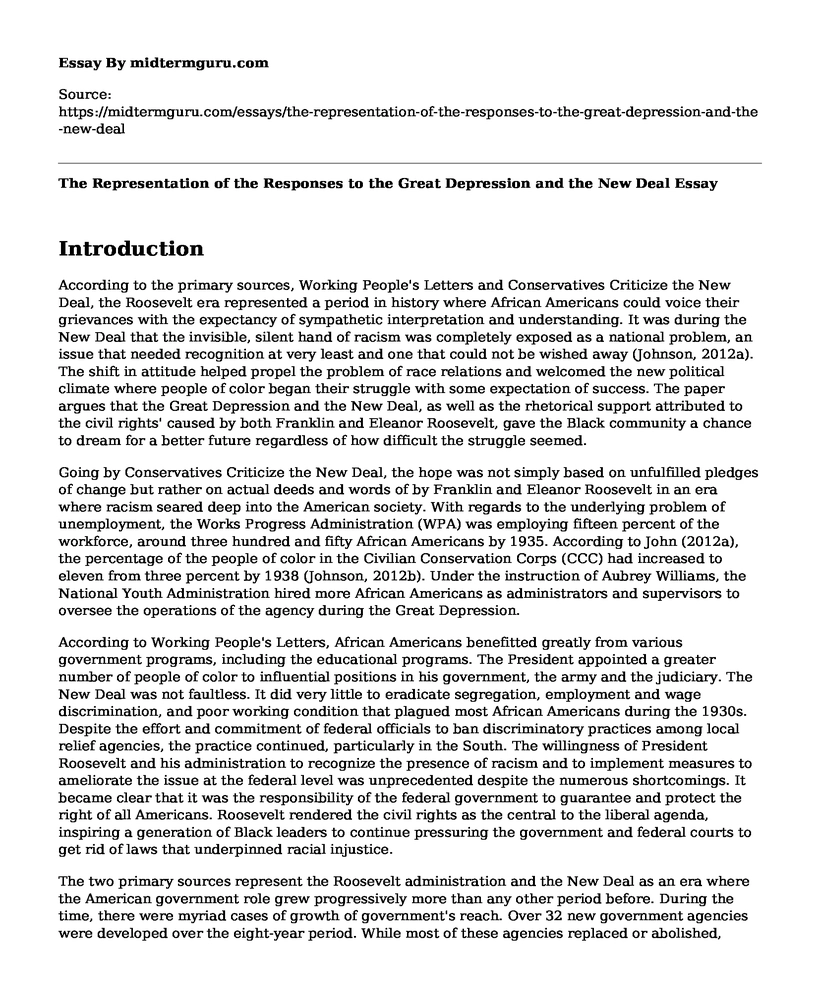Introduction
According to the primary sources, Working People's Letters and Conservatives Criticize the New Deal, the Roosevelt era represented a period in history where African Americans could voice their grievances with the expectancy of sympathetic interpretation and understanding. It was during the New Deal that the invisible, silent hand of racism was completely exposed as a national problem, an issue that needed recognition at very least and one that could not be wished away (Johnson, 2012a). The shift in attitude helped propel the problem of race relations and welcomed the new political climate where people of color began their struggle with some expectation of success. The paper argues that the Great Depression and the New Deal, as well as the rhetorical support attributed to the civil rights' caused by both Franklin and Eleanor Roosevelt, gave the Black community a chance to dream for a better future regardless of how difficult the struggle seemed.
Going by Conservatives Criticize the New Deal, the hope was not simply based on unfulfilled pledges of change but rather on actual deeds and words of by Franklin and Eleanor Roosevelt in an era where racism seared deep into the American society. With regards to the underlying problem of unemployment, the Works Progress Administration (WPA) was employing fifteen percent of the workforce, around three hundred and fifty African Americans by 1935. According to John (2012a), the percentage of the people of color in the Civilian Conservation Corps (CCC) had increased to eleven from three percent by 1938 (Johnson, 2012b). Under the instruction of Aubrey Williams, the National Youth Administration hired more African Americans as administrators and supervisors to oversee the operations of the agency during the Great Depression.
According to Working People's Letters, African Americans benefitted greatly from various government programs, including the educational programs. The President appointed a greater number of people of color to influential positions in his government, the army and the judiciary. The New Deal was not faultless. It did very little to eradicate segregation, employment and wage discrimination, and poor working condition that plagued most African Americans during the 1930s. Despite the effort and commitment of federal officials to ban discriminatory practices among local relief agencies, the practice continued, particularly in the South. The willingness of President Roosevelt and his administration to recognize the presence of racism and to implement measures to ameliorate the issue at the federal level was unprecedented despite the numerous shortcomings. It became clear that it was the responsibility of the federal government to guarantee and protect the right of all Americans. Roosevelt rendered the civil rights as the central to the liberal agenda, inspiring a generation of Black leaders to continue pressuring the government and federal courts to get rid of laws that underpinned racial injustice.
The two primary sources represent the Roosevelt administration and the New Deal as an era where the American government role grew progressively more than any other period before. During the time, there were myriad cases of growth of government's reach. Over 32 new government agencies were developed over the eight-year period. While most of these agencies replaced or abolished, some of them are still operational today. The degree of change evidenced during the New Deal era between 1933 and 1938 marked a significant change in American institutions in history ((Johnson, 2012b). The institutions and programs initiated were invaluable to the growth and success of the most powerful country globally. The sources show that most African Americans believed that it was a time where their entire plight could be genuinely be felt and addressed by the government.
References
Johnson, M. P. (2012a). Working People's Letters to the New Dealers. In Reading the American past: Selected historical documents. Boston: Bedford/St. Martin's.
Johnson, M. P. (2012b). Conservatives Criticize the New Deal. In Reading the American past: Selected historical documents. Boston: Bedford/St. Martin's.
Cite this page
The Representation of the Responses to the Great Depression and the New Deal. (2022, Sep 28). Retrieved from https://midtermguru.com/essays/the-representation-of-the-responses-to-the-great-depression-and-the-new-deal
If you are the original author of this essay and no longer wish to have it published on the midtermguru.com website, please click below to request its removal:
- How Hitlers Ideas Interacted With the Attitudes of Ordinary Germans
- Salvation by Langston Hughes and Her Socialist Years by Helen Keller - Reaction Paper Example
- The Cause-And-Effect Argument on USAir Flight 1549
- Paper Example on History of Mary Prince
- Essay Sample on Similarities and Differences Between Rome and Greece
- Essay Sample on "Slavery Footprint Survey"
- Article Analysis Essay on Classicism the Greek Legacy







